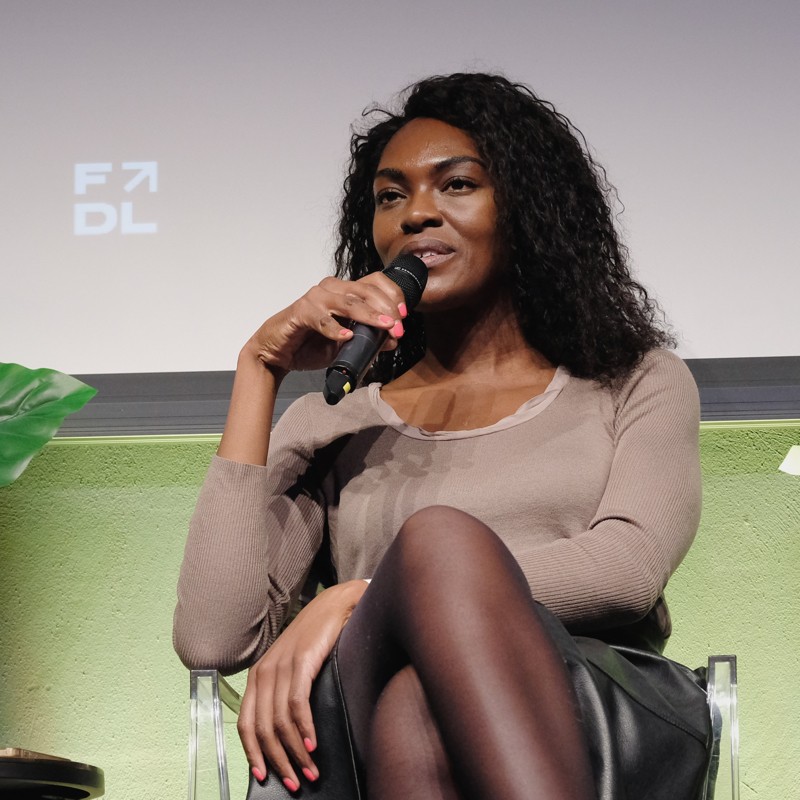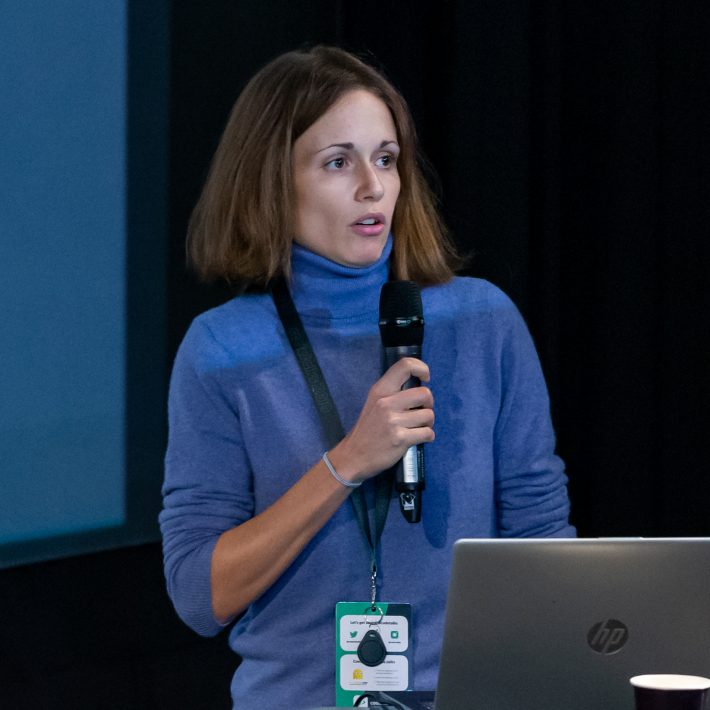4 min read
Illuminating the Tapestry of Women's Health: A Case Study
Rhiannon White, Chief Product Officer at Clue
Xena Tech Summit 2024
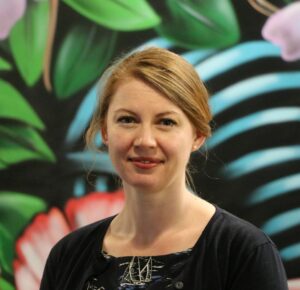
Rhiannon White is a highly empathetic product leader with deep experience building world-class software products, and the world-class product teams that build those products. She has experience across a range of industries and business models, including media and entertainment, retail, financial services, B2C, B2B & SaaS. She has held Product leadership roles in London, Silicon Valley, and Auckland and is currently the CPO at Clue.
During Rhiannon’s talk on our Inclusive Product & Beyond stage at the Xena Women in Tech Summit she suggested that her strategic prowess revolves around two simple yet impactful questions: What do people love or loathe and “What’s valuable enough that they’ll pay for it?”.
Gathering Inclusive User Feedback
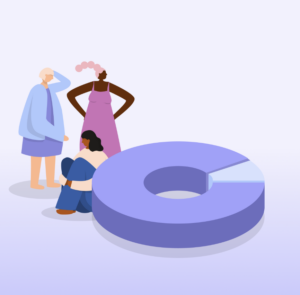
White started by painting a vivid picture of Clue’s user journey for the audience, a carefully crafted sequence of stages designed to ensure a seamless and empowering experience. She went on to elaborate on how they map their Jobs To Be Done against their Product Strategy. The journey unfolds in a linear progression guided by four key product principles: Trust, Orient, Empower, and Comfort.
Trust serves as the foundational pillar, with accuracy acting as the primary driver. It sets the stage for the user’s entire experience, establishing a reliable and secure foundation. The journey then seamlessly progresses to Orient, where users rely on intuitive cycle imagery to discern their position in time, fostering a deeper connection with their physiological rhythms.
Empowerment takes center stage as the journey advances, affording users the agency to take control of their status and choose their reactions. This stage not only provides a practical tool for cycle tracking but also serves as a catalyst for fostering a sense of autonomy and understanding of one’s own body. 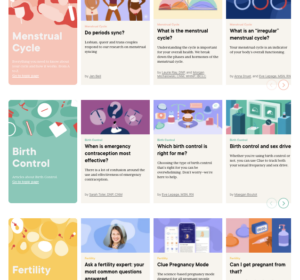
Finally, the journey culminates in Comfort, acknowledging the uniqueness of each user’s experience while simultaneously highlighting the shared nature of these intimate journeys.
Rhiannon emphasises Clue’s unwavering commitment to content, boldly stating that “Content strategy is product strategy.” The app’s mission extends beyond merely providing a tracking tool; it aspires to “solve for pain via content,” positioning itself as an active participant in addressing women’s health challenges. Furthermore, Clue’s commitment to closing a significant research gap, and acknowledging the historical absence of women in clinical trials, underscores its role as a product with a monumental mission.
The Case Study
Over 90% of people
with cycles experience pain
Rhianon used data as a starting point to explain how they used this user data to develop a feature. She went on to explain that for many people pain is something that they literally have to plan their lives around. Pain is the second most tracked category, after Period, and it comes up in every user interview ever, when learning how people use the app and what they’re trying to achieve. Numerous studies have shown that women and people with cycle pain tends to be taken less seriously and treated less, and Clue consistently gets this feedback from their user base. Their next step was to improve how they supported people with pain on the App.
Applying Clue’s Product Strategy Pillars
Next, Rhianon Took the audience through each part of the user feedback and how they applied each of their product pillars to define the product roadmap.
“This month I had a mild ache that felt like very soft cramps 2 days before was due, but it’s vastly different to the debilitating pain in the first/second day of my period – I’d just love to be able to keep track of that and reflect on the difference!”
Trust: Enable people to accurately track their pain experience, see it reflected in the app and predict their pain.
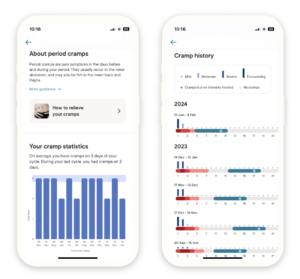
“I sometimes get cramps like unexpectedly, I have had it for years now for like 2 years. It makes me feel kind of weird, because when I get this cramps, I think, the (copper) IUD moved or something, and I get scared. […] So I would like an option
to specifically for that birth control to know like what’s normal and what’s not?”
Orient: Help people make sense of their pain by helping them understand it better and giving them guidance on what’s typical.
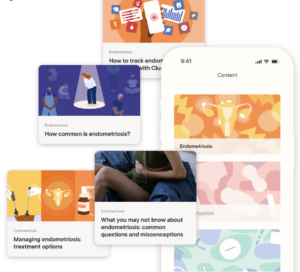
“I’ve sort of learned how to cope. I’m very much open to be honest, if there’s a better way. Maybe I don’t have to take painkillers, for example. Perhaps I can change my diet, or perhaps there’s something I can do prior to the cycle beginning. Whatever it is that the app can suggest to me, I suppose? That could be maybe preventative as opposed to coping with it.”
Empower: Enable people to advocate for themselves and support them in their journey to reduce and manage pain.
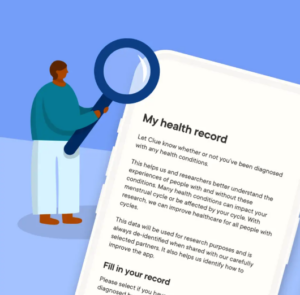
“So it’s quite as simple as asking other ladies how they’re coping and what they’re doing.”
Comfort: We comfort people by enabling them to see it’s ‘not in their head’, and by showing how their experiences are shared by many other people.
Closing the Data Gap
What is politely called ‘the research gap’ is more of a research ‘gaping crater’ when it comes to women’s health, with the direct consequence that millions of people are living with symptoms that could benefit from medical support, but too often it takes far, far too long for them to access that support and treatment. Getting a diagnosis is required to get treatment. Getting a diagnosis means having data to show that someone 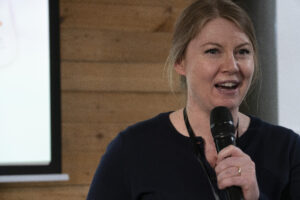 is living with a health condition. Clue’s on a mission to create the world’s largest data set that matches people who have confirmed diagnoses, and the patterns in their menstrual cycles and wider tracked health data, with people who have those same patterns but do not yet have a diagnosis.
is living with a health condition. Clue’s on a mission to create the world’s largest data set that matches people who have confirmed diagnoses, and the patterns in their menstrual cycles and wider tracked health data, with people who have those same patterns but do not yet have a diagnosis.
With this research, Clue hopes to uncover the insights and patterns related to menstrual health and these diagnoses, and develop personalised insights that will support people to engage with their health systems and accelerate their diagnoses and access the care that they deserve. Faster access to treatment and care means less pain, more productivity, less compounding health impacts and greater agency.
As the tapestry of women’s health unfolds, leaders like Rhiannon White and Clue stand at the forefront, weaving a narrative that goes beyond tracking cycles – it’s about empowering women and reshaping societal norms.
